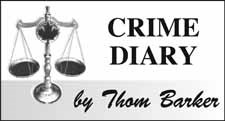One thing that never seems to get enough attention is white-collar crime. Canada has an international reputation for being a safe haven for would-be white-collar criminals. We have an abysmal record for catching, prosecuting and convicting corporate fraudsters.
"Canada is 20 times safer to carry out corporate criminal activity than the United States," said Martin Chambers, a former Vancouver lawyer who was disbarred and convicted of fraud.
Of course, that does not mean it is really all that dangerous in the United States. Since the financial crisis of 2008 and 2009, only 55 corporate officers have been the subject of civil enforcement actions by the Securities and Exchange Commission. There is no way of knowing how many have been the subject of criminal investigations or prosecutions because the Justice Department doesn't keep those statistics anymore.
Most experts, though, will tell you it is a very low number. "I can tell you why you wouldn't keep the data," said William Black, a former U.S. bank regulator, now a professor at the University of Missouri-Kansas City. "Because it would be really embarrassing."
There's nothing new here, of course. The rich have always stolen from the rest of us. Or, if not technically stolen, have rigged the laws, or paid off the wannabe-rich to rig the laws in their favour. Plus, white-collar criminals tend to be clever and the world of finance is exceptionally complex.
"A man who has never gone to school may steal from a freight car, but if he has a university education he may steal the whole railroad," said Franklin D. Roosevelt.
But, I digress.
It's a huge problem in Canada. A PriceWaterhouse-Coopers study reported 56 per cent of Canadian corporations had been victims of serious fraud at an average loss of $2 million. And individual investors have been bilked out of countless millions by ponzi schemes , phony investment opportunities and stock manipulation.
Forbes magazine called the Vancouver Stock Exchange, now part of the Canadian Venture Exchange, "the scam capital of the world."
In 2003, the RCMP decided to get tough on white-collar crime with the inception of their Integrated Market Enforcement Teams (IMET). It is not working. In nine years, they have only managed 11 convictions.
On Monday, IMET and the Crown received another blow when an Ontario Superior Court Judge Frank Morrocco acquitted three former executives of Nortel calling the fraud charges against them "baseless." The RCMP and prosecutors spent eight years and an unknown amount of money, probably in the millions of dollars.
It's a shame.
Don't get me wrong, I'm always happy when justice prevails. I would certainly not want to see innocent people convicted, but it just seems so unjust that so many people, who are already rich, are getting away with bilking the system while so many others are going to jail for stealing groceries to feed their families.
The failure to get a conviction in the case again raised questions about whether the IMET program should be scrapped altogether.
The national police force is not giving up, though.
In November, Bob Paulson, commissioner of the RCMP, announced a new strategic direction for the teams: traditional police-work.
"Somehow in our strategy development, we've taken the view that in order to catch the criminals, we need to get more like them-we need to have more market knowledge, more experience in the markets-and to a certain extent that's true. But really the key for us is to use our tried-and-true strategies for catching those people," he said.
So, as IMET enters its second decade, Paulson has instructed investigators to go back to basics such as undercover operations, wiretaps, agents and informants.
Fingers crossed, but not holding my breath.




